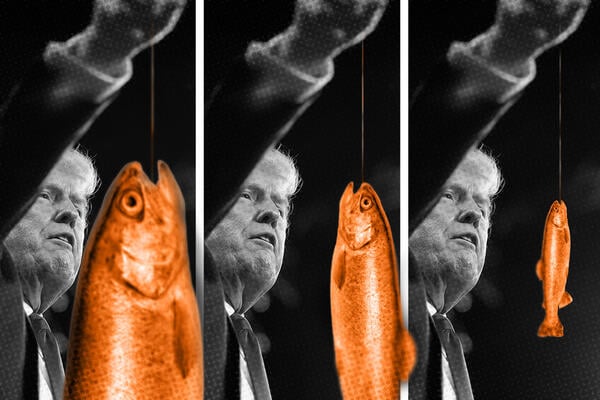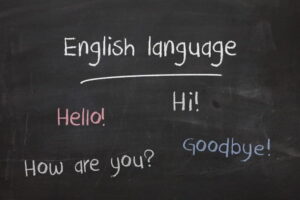
Are Trump’s Settlements Losing Steam?
Amid a series of legal showdowns with high-profile universities, the Trump administration has racked up four agreements in recent months, prompting policy changes and huge fines. What do they say about the government’s tactics—and what do they mean for other colleges and universities pondering whether to negotiate?
In July the University of Pennsylvania was the first to strike a deal, in its case to resolve a Title IX investigation. Penn agreed to erase former swimmer Lia Thomas, a transgender woman, from its record books; bar transgender athletes from future competition; and send personal apology letters “to each impacted female swimmer,” among other concessions. In exchange, the Trump administration restored $175 million in federal research funding frozen amid the investigation.
Columbia University was the next to reach a deal, agreeing to pay a $221 million fine and overhaul admissions, disciplinary processes and academic programs, among other far-reaching changes. For its part, the government dropped investigations into campus antisemitism and restored $400 million in research funding. The agreement prompted criticism from academics who argued Columbia capitulated to authoritarian demands.
That deal was soon followed by a settlement with Brown University, also in July. In response to claims that Brown failed to adequately police antisemitism, officials agreed to conduct a campus climate survey, codify certain changes aimed at preventing discrimination and make concessions regarding gender definitions and treatment of transgender patients, among other things. Brown also agreed to spend $50 million over the course of a decade on state workforce development.
As a result of the deal, the federal government restored $510 million in frozen research funding.
Most recently, under pressure from the Department of Justice over allegedly illegal diversity, equity and inclusion initiatives, the University of Virginia struck a deal with the federal government. Under that agreement, UVA committed to purge all DEI programming and adhere to the Trump administration’s expansive interpretation of the 2023 Supreme Court ruling that struck down race-conscious admissions policies. UVA also agreed to provide compliance reports.
But the latest deal raises questions about whether such agreements are losing steam: The flurry of deals reached over the summer has given way to protracted legal battles with institutions that so far seem unwilling to settle.
While some observers feared a Columbia-like agreement that would impose sweeping changes on UVA, the university appears to have emerged largely unscathed based on the initial agreement. However, critics have warned that the federal government could weaponize the process of compliance.
Assessing the Settlements
Legal experts caution that the sample size for settlements makes it hard to reach broad conclusions. But none, they note, has had the same far-reaching impact as the Columbia deal.
“I think that what we are seeing is that every settlement seems to be somewhat situational,” Peter Lake, a law professor at Stetson University College of Law, told Inside Higher Ed.
James Nussbaum, who leads the higher education practice at the Indiana law firm Church Church Hittle + Antrim, was also “hesitant to draw conclusions or themes from such a small set of data,” but noted that the federal government wrangled fewer concessions out of Virginia.
“The first few settlements were all Ivy League and private schools. Virginia is the first public school to settle, and it seems like their settlement is less than the previous settlements,” Nussbaum said.
But Lake suggested that the totality of the federal government’s impact on UVA isn’t on paper. He believes the fact that President Jim Ryan was “forced out” amid the upheaval was “huge”—even though it wasn’t formally part of the settlement.
“I do think the ultimate goal for a lot of the activity that’s going on is to engineer change of control at major institutions, and if the federal government is successful in being able to drive out a president and control who the senior leadership of the institution is, that’s probably more important in the long run than a monetary fine,” Lake said. “And I’d be very cautious about the monitoring obligations, because that could easily turn into ‘we don’t think you’re complying.’”
Beyond potential compliance tripwires, the UVA deal also set up another political battle. While the university has reached a détente with the federal government, the arrangement has infuriated state Democrats. Senate Majority Leader Scott Surovell and fellow Democratic senator L. Louise Lucas expressed concerns last week in a letter to UVA rector Rachel Sheridan.
“While we understand the tremendous pressure the University has faced—pressure that ultimately led to President Ryan’s resignation—we believe UVA capitulated to legally dubious federal overreach without mounting necessary constitutional challenges,” the lawmakers wrote.
State Democrats also expressed concern about the “ambiguity of conditions,” arguing the deal’s vagueness “creates ongoing legal exposure for University leadership through 2028 and beyond.”
‘Achieving Reforms’
Asked whether the Trump administration is seeing diminishing returns with recent settlements, such as the UVA case, a Department of Education spokesperson pushed back.
“The Trump Administration is achieving reforms on higher education campuses that conservatives have dreamed about for 50 years. These deals are a roadmap for the sector and they are already driving changes and restoring an academic culture to campuses,” spokesperson Madi Biedermann wrote by email.
Biedermann added that “institutions are once again committed to enforcing federal civil rights laws consistently, they are rooting out DEI and unconstitutional race preferences, and they are acknowledging sex as a biological reality in sports and intimate spaces.” Colleges have also “taken meaningful steps” to improve campus disciplinary policies as well as viewpoint diversity, she wrote. “These reforms will restore our nation’s campuses to places of truth-seeking and excellence.”
An Education Department official noted that the agreements have been “carefully tailored to the problems on each campus. The differences in the agreements reflect this. Not every campus has the same problems, and some campuses have more serious challenges than others.”
In the Crosshairs
While the Trump administration has won settlements with some universities, others remain resistant.
In April, the federal government alleged that Harvard University failed to adequately handle antisemitism concerns on campus and demanded a series of changes. They included an overhaul of hiring and admissions, restrictions on campus protests, and greater scrutiny of incoming international students to exclude those “supportive of terrorism or anti-Semitism,” among other reforms.
Harvard responded with a lawsuit that prompted a legal back-and-forth in which the Trump administration temporarily froze more than $2 billion in federal research funding, tried to cut off the university’s ability to host international students and leveraged other tools in an effort to force Harvard to bend. Harvard ultimately won a court battle in July, but the university continues to clash with the federal government. And despite Harvard’s legal victory, rumors of a settlement persist.
In late September, President Donald Trump said during an Oval Office event that Education Secretary Linda McMahon was “finishing up the final details” on a deal with Harvard, which would include a $500 million payment. He also said Harvard would open trade schools as part of the deal. Last month, he claimed, “We reached a concept of a deal” with Harvard.
But despite Trump’s repeated statements, no deal with Harvard has yet materialized.
“Fairly or unfairly, a lot of people are putting a lot of pressure on Harvard to sort of carry the mantle for higher education writ large,” Nussbaum said. “I think how favorably or unfavorably that settlement would be viewed by higher education as a sector is likely to affect how all the other schools plan for or respond to their own complaints with the Department of Education. Or the administration, if the Department of Education doesn’t exist anymore.”
The Trump administration has demanded even more from the University of California, Los Angeles, asking for a $1.2 billion payout, according to a draft of the resolution. That fine would be accompanied by restrictions on international enrollment, a ban on transgender athletes competing on women’s sports teams, limits on treatments for transgender patients at UCLA’s medical school and more.
The federal government has sought to pressure UCLA into agreeing by clamping down on hundreds of dollars in research funding, but like Harvard, UCLA has fought back in the courts. The university won a preliminary injunction to restore funds in September but remains in the crosshairs.
Lake said that the stakes are high in both the UCLA and Harvard cases, with any settlement sending shock waves through higher education. While both institutions have deep pockets and can afford a legal fight or settlement, the implications for the sector—especially for colleges with lesser means—would be far-reaching.
He believes a settlement from either would have a domino effect on higher education.
“I think each time there’s a settlement reached, institutions that have been on the radar of the federal government will begin to think—much like dominoes—they’ll have to find a way forward with a settlement,” Lake said. “I think many [institutions] are situated differently, both in the state or politically in the issues that have been raised. I think people will be calculating what kind of deal they might be able to get. But at some point we’re going to get to that moment where people will wonder if there’s any alternative but to find a way to concede to some demands.”
Source link



